By Tyler Yates
Impunity Watch Reporter, Middle East
HAMA, Syria — After anti-government protests last Friday, Syrian troops began a now continuing barrage of raids and arrests, aimed at quelling the country’s unrest in many of its more notorious trouble spots.

Hama, a city of around 800,000 people, still quaking with scars from a previous governmental onslaught of nearly a generation ago, is one of those trouble spots. The city, located in a corridor between Damascus and Aleppo, has become a symbolic center for what has become a four-month uprising against the ruling Assad family.
Recently, the city’s protests have been gaining momentum. This was clearly evidenced on Friday, by a demonstration of tens of thousands; gathering in Hama’s appropriately renamed Freedom Square.
Hama is considered by some to be liberated, but this did not stop the Syrian security forces from raiding the city’s outskirts and making numerous arrests on Monday.
One resident saw “at least 30 buses carrying soldiers and security police.” The soldiers were “firing randomly in residential neighborhoods.” The random shooting has injured at least 21 people, and killed around 7.
The city’s inhabitants are not taking the military’s actions sitting down. Activists threw rocks, while others attempted to build barricades out of whatever they could find – burning tires, stones, and trash bins. There are accounts of self-defense committees being created to patrol some of the neighborhoods. Their purpose appears to be both to maintain order and to protect from governmental crackdowns.
The Syrian forces retreated almost as quickly as they appeared, but the people of Hama don’t think they are gone for good. “People are waiting. They can’t control Hama unless they wipe out the people here,” said a 24-year-old student who identified himself only as Abdel-Rahman.
Prior to Monday’s events the government had cited Hama as an example of the leadership’s good will, allowing dissent as long as it didn’t cause too much harm. This recent uprising has shown that Hama is in reality a vexing problem for the government.
The city’s name echoes with memories of the government’s historic brutality. In 1982, the Syrian military stormed the city to suppress an armed Islamic opposition group, killing at least 10,000 people. For this reason, the government has gone out of its way to avoid stirring too much trouble in the city. In June, after around 73 people were killed during a protest in Hama, the government ordered a military withdrawal and fired a group of security officials.
Despite this reluctance for the government to fight the conflict in the very city that symbolizes the opposition’s struggle, it appears it was inevitable. The opposition has deep roots in Hama, and the uprisings momentum shows no sign of letting up.
For more information, please see:
Al Jazeera — Several ‘shot dead’ in Hama crackdown — 5 July 2011
Al Jazeera — ‘Shooting and arrests’ in Syrian city — 4 July 2011
BBC News — Syria unrest: ‘Arrests in Hama as tanks move on Idlib’ — 4 July 2011
New York Times — Fears Rise With Arrests in Restive Syrian City — 4 July 2011


